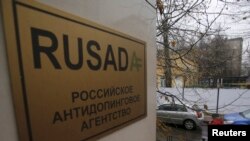Russian Deputy Prime Minister Vitaly Mutko told the Russian sports daily Sports Express on January 19 that female doping results can be distorted if athletes have had sex days before the test.
Mutko has been outspoken since the McLaren report (part one, part two) uncovered widespread, state-sanctioned doping in Russian sport.
The report led to Russia's track-and-field athletes being banned from the 2016 Olympic Games in Rio de Janerio.
Russian athletes still remain banned from international competition.
Part of the report outlines samples taken from two women ice hockey players that contained male DNA, apparently what Mutko was referring to.
"If you have sex five days before taking a doping test, they can find male DNA in you," said Mutko.
"If a female athlete undergoes a drug test within five days after the act, then the test will show that she has male hormones - and yet it evokes suspicions of her using different drugs."
However, experts dismiss Mutko's claims as unsubstantiated, including the globe's anti-doping body, the World Anti-Doping Agency (WADA).
In an email response to Polygraph.info, a WADA spokesperson said there was no scientific basis to support Mutko's claim.
"It is a widely accepted scientific view that sexual intercourse does not interfere in any way with a well collected DNA sample. Any contamination issues would be clearly visible during sample analysis," according to the WADA spokesperson.
Arguing that Russian athletes had been treated unfairly, Mutko highlighted the cases of Canadian pole vault world champion Shawn Barber and French tennis player Richard Gasquet.
Both avoided punishment after blaming positive drug tests for cocaine on kissing women who had ingested the banned substance.
"One [athlete] can kiss a girl who has taken a drug.A foreign [athlete] is reinstated based on this while a Russian is punished," Mutko told Sports-Express.
An anti-doping expert, who requested anonymity, told Polygraph.info that Mutko's comparison was not valid since cocaine was easily detectable since it is an "exogenous" substance.
Some reacted with amusement to Mutko's assertions, including Kelly Sotherton, a former British heptathlete.
Russian President Vladimir Putin has steadfastly denied the existence of state-sponsored sports doping program, a message echoed by other Russian officials.
“Russia has never created [a doping program]. It is simply impossible and we will do everything to prove that this never happened, the state doping system or support of performance-enhancing drugs,” he said at his recent year-end press conference.
Mutko served as Russian sports minister when the first part of the McLaren report was issued in July 2016.
Although the minister was not directly named in the report, independent Canadian expert Richard McLaren said claims Mutko was unaware of the program are “inconceivable.”
Amid the doping scandal, Mutko was "promoted" to deputy prime minister in October 2016.
A source close to the government told The Moscow Times his promotion was part of a "regrouping effort."
As deputy prime minister, Mutko oversees sports, tourism and youth policy, although he is no longer directly involved in international sporting issues.
His latest remarks may have some in the Kremlin wishing he'd stick to his domestic agenda.





